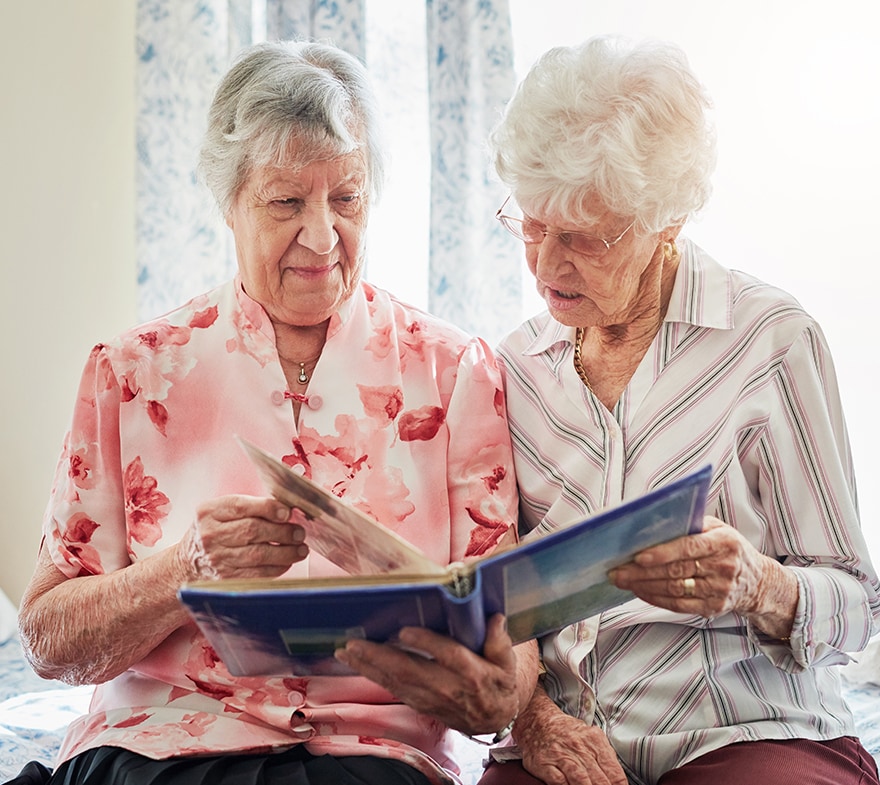Let Us Be Your Guide
Choosing a senior living community is a significant step, but we’re here to help.
Our resources are your friendly guide to help you find straightforward answers to common questions about our Hermitage community. Let us shed light on our assisted living and Serenity Memory Care lifestyles, and explain some terms you might encounter during this life-changing journey. Our goal is to provide you with the information you need to feel confident and well-informed as you consider the possibilities for yourself or your loved one.
Got Questions? We’re All Ears!
We’ve put together a helpful list of frequently asked questions and a glossary below. However, we know that every individual’s situation is unique, and you might have specific questions that aren’t covered here.
Don’t hesitate to contact us! We genuinely welcome the chance to provide personalized answers and discuss how life at The McKendree can meet your specific needs and desires.

Frequently Asked Questions
Assisted living at The McKendree is all about giving the support our residents need while maintaining the lifestyle they love.
Think of it as having a helping hand nearby for daily tasks (like getting dressed, managing medications, or moving around) while your loved one continues to live the life they love. We focus on making things easier, so they can focus on enjoying their day!
Great question! While both offer support, the main difference is the level of care. Assisted living feels more like home and provides help with daily activities, focusing on independence.
Skilled nursing provides more intensive, medically focused care and rehabilitation, often for those recovering from surgery or managing complex health conditions. We can help you and your loved one determine which environment is the best fit for their unique needs.
Serenity Memory Care at The McKendree provides specialized care in a secure, nurturing environment designed specifically for individuals living with Alzheimer’s or other forms of dementia.
We focus on person-centered care, celebrating individual strengths, and using tailored activities and therapies to promote engagement, connection, and quality of life. Our staff also receives specialized training in dementia care techniques.
Families are crucial to the resident experience. We encourage regular communication and visits. We also offer educational resources and support to help families navigate the journey of memory loss alongside their loved ones.
Respite care, or short-term stays, is a great option for several situations! It’s perfect for individuals needing temporary support while recovering from surgery or illness. It also provides a valuable break for family caregivers who need time to rest and recharge.
Additionally, it can serve as a wonderful way to experience life in our community on a trial basis before making a longer-term decision.
Respite care guests enjoy access to the same great amenities and services as our long-term residents! This typically includes a comfortable suite, 3 delicious daily meals, participation in scheduled activities and events, housekeeping, and personalized care assistance as needed during their stay.
Our respite stays are flexible! We can accommodate stays ranging from a few days to several weeks, depending on individual needs and availability. Please contact us to discuss your specific situation.
Think of it as a range of living options and support services available, often within one community or organization, designed to meet residents’ changing needs over time. This might include assisted living, memory care, and sometimes skilled nursing or rehabilitation services, allowing residents to transition smoothly if their care requirements change.
A big advantage is peace of mind! Knowing that different levels of support are available if needed can be very reassuring for both residents and their families. It often means less disruption, allowing residents to remain in a familiar setting with established relationships even if their health needs evolve.
Absolutely! We encourage residents to personalize their apartments with their own furniture, photos, and cherished items. Making your space feel like your home is important, and we love seeing how residents make their suites uniquely theirs.
While we love furry friends, our community is not pet-friendly at this time. We truly appreciate your understanding and are happy to answer any questions you may have!
Our goal is to make life easier and more enjoyable! Typical services include personalized assistance with daily activities, medication reminders or management, delicious meals served daily, housekeeping and laundry services, scheduled transportation, and a full calendar of fun social activities and events.
Definitely! Connection and fun are big parts of life here. We offer a wide range of social events, engaging activities, wellness classes, cultural outings, entertainment, and more. There’s always something happening to keep residents active, connected, and entertained.
We’d love to show you around! The best way is to fill out the contact form on our website or call us directly. During your visit, you can see the living spaces, meet our friendly team, feel the community atmosphere, and get answers to all your specific questions.
Consider if you or your loved one could use a little extra help with daily tasks like meals, bathing, dressing, mobility, or managing medications. Assisting living is ideal for those who want to maintain independence, but would benefit from having support readily available in a vibrant, social setting. We’re happy to chat through your specific situation.
Costs can vary depending on the specific apartment chosen and the level of care needed. While Medicare generally doesn’t cover long-term assisted living costs, some long-term care insurance policies might offer coverage. We recommend checking your specific policy. We’re happy to discuss pricing details and potential financial avenues during a personal consultation.
Resident safety is our top priority. Our community has clear protocols for medical emergencies, and our staff is trained to respond quickly. We also have emergency response systems in place and work closely with local healthcare providers to ensure residents receive prompt and appropriate medical attention when needed.
Glossary of Common Senior Living Terms
Exploring senior living options can feel like trying to learn a new language overnight. Here’s a handy guide to some of the most common phrases, neatly organized by category:
- Assisted Living: A type of senior living experience that offers housing, meals, and support services, including help with ADLs and medication management, in a home-like setting. It balances independence with available care.
- Continuing Care Retirement Community (CCRC):(New Term) A community offering multiple levels of care (like independent living, assisted living, skilled nursing) on one campus, allowing residents to transition between levels as their needs change.
- Long-Term Care (LTC): A general term for ongoing care services needed by people who have chronic health conditions or disabilities. This can include assisted living, memory care, or skilled nursing care.
- Memory Care: Specialized care provided in a secure environment for individuals living with Alzheimer’s disease or other forms of dementia. It focuses on safety, engagement, and therapies tailored to cognitive needs. (See our Serenity Memory Care program!)
- Respite Care or Short-Term Stays: Short-term stays offered by senior living communities, providing temporary care for an individual while their regular caregiver takes a break or recovers themselves. It can also be a way to try out community living.
- Skilled Nursing Care: A higher level of medical care provided by licensed nurses (RNs or LPNs), including wound care, IV therapy, injections, and complex medical monitoring. Often provided in a Skilled Nursing Facility (SNF) or rehabilitation center.
- Activities of Daily Living (ADLs): Everyday personal tasks, such as bathing, dressing, eating, walking (transferring), and using the restroom (toileting). Assessing ADLs helps determine the level of support a person might need.
- Aging in Place: The ability for a senior to continue living in their chosen residence (whether their own home or a senior living apartment) even as their care needs increase, receiving additional services there rather than moving to a higher level of care setting.
- Caregiver: Anyone who provides care and support to another person, whether it’s a family member, friend, or professional.
- Continuum of Care: A comprehensive range of health and support services available to meet the changing needs of individuals over time, often within a single organization or community.
- Occupational Therapy (OT): Therapy focused on helping people regain skills needed for daily living and working, such as dressing, cooking, or managing household tasks after an illness or injury.
- Person-Centered Care: An approach to care that focuses on the individual’s preferences, values, and needs, ensuring they are actively involved in decisions about their own care and daily life.
- Physical Therapy (PT): Therapy focused on improving movement, strength, balance, and mobility, often after surgery, illness, or injury.
- Rehabilitation: Services like physical, occupational, or speech therapy designed to help someone recover abilities after an illness, injury, or surgery.
- Speech Therapy: Therapy focused on helping people recover or improve communication skills (speaking, understanding) and swallowing function, often after a stroke or neurological condition.
- Long-Term Care Insurance: Private insurance designed specifically to help cover the costs of long-term care services, which are often not covered by regular health insurance or Medicare.
- Medicaid: A joint federal and state government program that helps cover healthcare costs for people with limited income and resources. Eligibility rules vary by state.
- Medicare: A federal health insurance program primarily for people aged 65 and older, and for some younger people with disabilities. It generally covers hospital stays (Part A), doctor visits (Part B), and prescription drugs (Part D), but typically does not cover long-term custodial care in assisted living.
Supporting Your Family Every Step of the Way
Choosing the right care for yourself or a loved one can feel overwhelming, but you’re not alone. At The McKendree, we’re here to answer your questions and provide support as you explore options for a healthier, more fulfilling life.
Contact us today to learn more or schedule a tour—we’re ready to help you find the support you and your family deserve.

